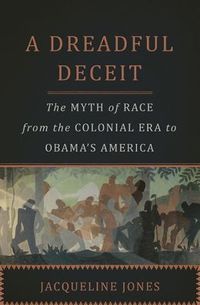

Purchase
The Myth of Race from the Colonial Era to Obama's America
Basic Books
December 2013
On Sale: December 10, 2013
400 pages
ISBN: 0465036708
EAN: 9780465036707
Kindle: B00H1YPUTE
Hardcover / e-Book
Add to Wish List
Non-Fiction
In 1656, a Maryland planter tortured and killed an enslaved
man named Antonio, an Angolan who refused to work in the
fields. Three hundred years later, Simon P. Owens battled
soul-deadening technologies as well as the fiction of “race”
that divided him from his co-workers in a Detroit
auto-assembly plant. Separated by time and space, Antonio
and Owens nevertheless shared a distinct kind of political
vulnerability; they lacked rights and opportunities in
societies that accorded marked privileges to people labeled
“white.”
An American creation myth posits that these
two black men were the victims of “racial” discrimination, a
primal prejudice that the United States has haltingly but
gradually repudiated over the course of many generations.
In A Dreadful Deceit, award-winning historian
Jacqueline Jones traces the lives of Antonio, Owens, and
four other African Americans to illustrate the strange
history of “race” in America. In truth, Jones shows, race
does not exist, and the very factors that we think of as
determining it— a person’s heritage or skin color—are mere
pretexts for the brutalization of powerless people by the
powerful. Jones shows that for decades, southern planters
did not even bother to justify slavery by invoking the
concept of race; only in the late eighteenth century did
whites begin to rationalize the exploitation and
marginalization of blacks through notions of “racial”
difference. Indeed, race amounted to a political strategy
calculated to defend overt forms of discrimination, as
revealed in the stories of Boston King, a fugitive in
Revolutionary South Carolina; Elleanor Eldridge, a savvy but
ill-starred businesswoman in antebellum Providence, Rhode
Island; Richard W. White, a Union veteran and Republican
politician in post-Civil War Savannah; and William
Holtzclaw, founder of an industrial school for blacks in
Mississippi, where many whites opposed black schooling of
any kind. These stories expose the fluid, contingent, and
contradictory idea of race, and the disastrous effects it
has had, both in the past and in our own supposedly
post-racial society.
Expansive, visionary, and
provocative, A Dreadful Deceit explodes the
pernicious fiction that has shaped four centuries of
American history.
Comments
No comments posted.
Registered users may leave comments.
Log in or register now!
| 


 © 2003-2025 off-the-edge.net
all rights reserved Privacy Policy
© 2003-2025 off-the-edge.net
all rights reserved Privacy Policy